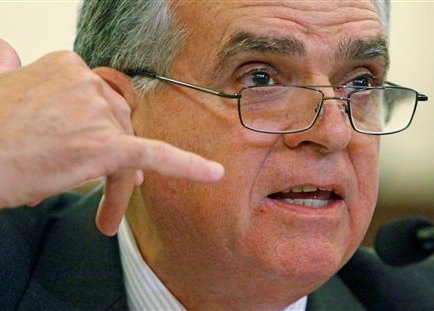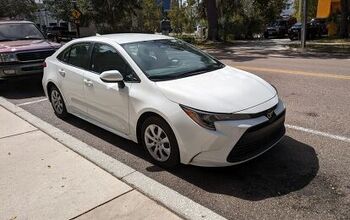US DOT Removes Results Measurement From Transit Funding Decisions
US Transportation Secretary Ray LaHood announced on Wednesday that he would re-write funding guidelines to dispense with rigid cost-benefit analysis when deciding which transit programs should receive funds. Under the previous system, because motorists provided the majority of the funding through the gas tax, money was allocated to cost-effective transit programs that promised the greatest overall reduction in traffic congestion. In remarks at the Transportation Research Board annual meeting, LaHood explained that the objective criteria will be replaced by a set of goals.
“Measuring only cost and how fast a project can move the most people the greatest distance simply misses the boat and… has slowed down transit expansion,” LaHood reflected yesterday. “In 2010, a policy that has that effect is ridiculous.”
One of the major hurdles in spending US motorist dollars on projects such as streetcars has been their extremely high cost and low usage rates. Fort Worth, Texas, for example, wants to spend $250 million on a streetcar project that is likely to serve between one and two percent of the population. With new flexibility to spend large sums to benefit a small constituency, LaHood will now be able to exert influence on electoral battleground states over the next few years.
“I’ll make sure those investments in manufacturing help our most distressed communities in Illinois, Michigan, Ohio, Pennsylvania, and elsewhere,” LaHood said.
The administration’s move was heralded by Capitol Hill’s most prominent advocate of streetcars and bicycles, Congressman Earl Blumenauer (D-Washington).
“In line with President Obama’s commitment to promoting livable communities, USDOT will drop a Bush-era practice that emphasized out-dated analyses focused primarily on travel-time savings for suburban commuters,” a Blumenauer statement explained.
The Federal Transit Administration now take steps to codify new regulations to reflect the updated priorities. In his Wednesday speech, LaHood also emphasized the need to increase spending across the board on transportation projects to help the economy.
“Everywhere I go, the message is loud and clear,” LaHood said. “They want the opportunity to leave their cars behind. To live near work and schools and good hospitals. And to enjoy clean, green neighborhoods. Our stimulus funds are helping many communities begin to realize those dreams…. But if we’re really serious about creating livable, sustainable communities built around good transportation, then we must reform our current spending programs.”
LaHood cited the spending of $8 billion in taxpayer dollars on a new passenger rail program, expanded support for Amtrak and another $1.5 billion in discretionary TIGER grants, which are designed to support efforts such as tolling, as evidence of the administration’s willingness to spend on priority projects.
More by The Newspaper
Latest Car Reviews
Read moreLatest Product Reviews
Read moreRecent Comments
- Jkross22 When I think about products that I buy that are of the highest quality or are of great value, I have no idea if they are made as a whole or in parts by unionized employees. As a customer, that's really all I care about. When I think about services I receive from unionized and non-unionized employees, it varies from C- to F levels of service. Will unionizing make the cars better or worse?
- Namesakeone I think it's the age old conundrum: Every company (or industry) wants every other one to pay its workers well; well-paid workers make great customers. But nobody wants to pay their own workers well; that would eat into profits. So instead of what Henry Ford (the first) did over a century ago, we will have a lot of companies copying Nike in the 1980s: third-world employees (with a few highly-paid celebrity athlete endorsers) selling overpriced products to upper-middle-class Americans (with a few urban street youths willing to literally kill for that product), until there are no more upper-middle-class Americans left.
- ToolGuy I was challenged by Tim's incisive opinion, but thankfully Jeff's multiple vanilla truisms have set me straight. Or something. 😉
- ChristianWimmer The body kit modifications ruined it for me.
- ToolGuy "I have my stance -- I won't prejudice the commentariat by sharing it."• Like Tim, I have my opinion and it is perfect and above reproach (as long as I keep it to myself). I would hate to share it with the world and risk having someone critique it. LOL.


































Comments
Join the conversation
For me, a livable community is one with single family detached houses well separated from one another and the flexibility of the private automobile to get wherever I want on my own schedule. Being crowded cheek by jowl with neighbors, spending hours riding public transportation or enduring heat, cold, rain and snow on foot or a bicycle is the opposite of livable. Yet, that's what LaHood and his ilk want for us.
Unlike most people on this site, I commute to work by rail and subway. I have four cars, so I hardly am the rah-rah train guy, but the reality is that my three hour round trip each day would take longer by car and would cost more than the $360 monthly rail pass. However, I live in the ideal situation for rail - suburbs laid out neatly in a line from a major city. It is really difficult to make money in transit, so subsidies are pretty much inevitable but why is that such a bad thing, provided the transit system is run in an efficient manner? The simple fact is that automobile transit has been subsidized for years, often at the expense of transit. You really don't think the price of gas really reflects the true cost of discovery, refining, delivery, national security and health issues related to burning it do you? Transit itself in no panacea however. A train missed by five minutes often means getting home a half hour later. Couple that with loud obnoxious people, cell phones, blaring iPods and it's no wonder people rather drive. And starting February, I will be off the train and on the road as my new position comes with a car...don't know if that is a good thing or not.